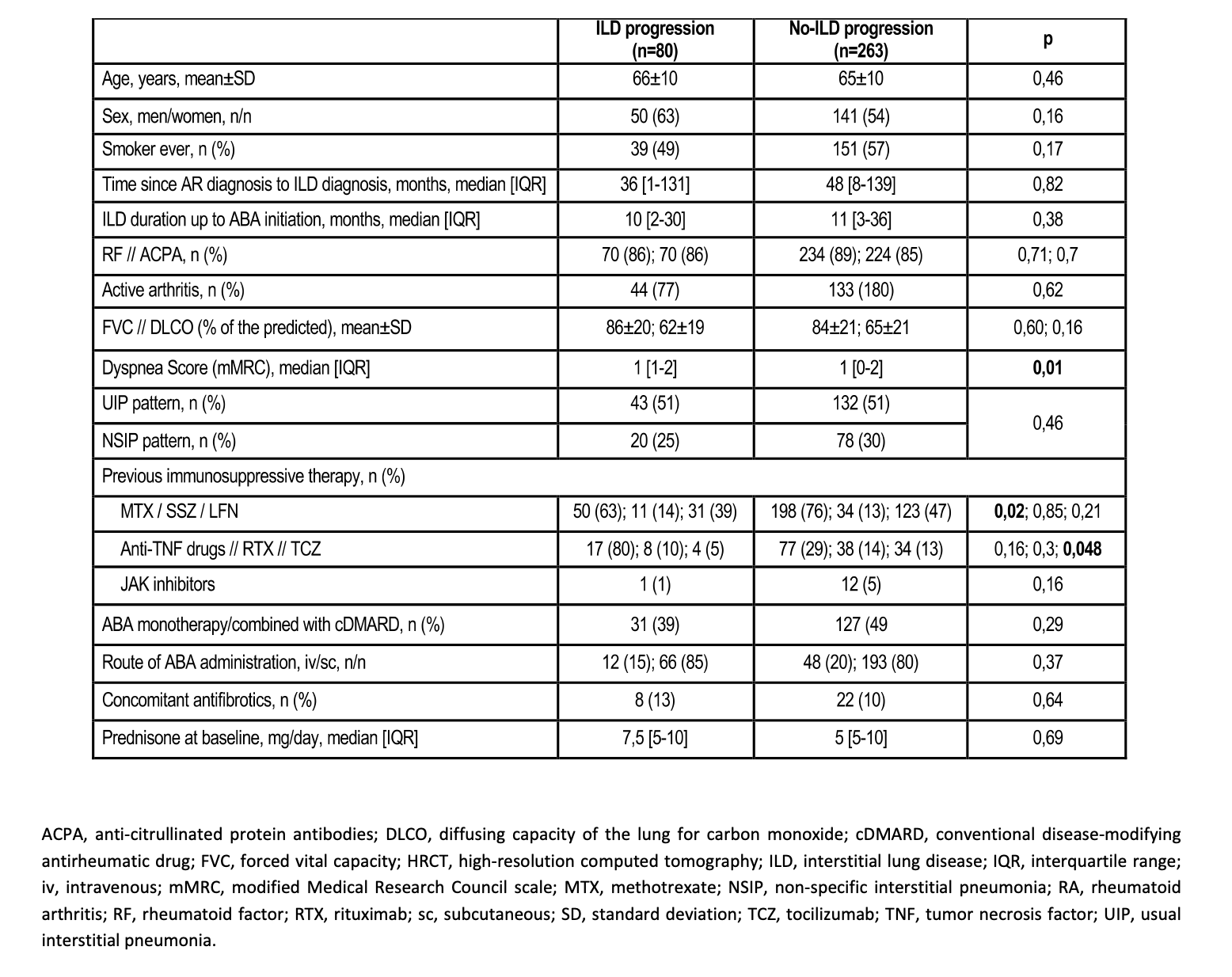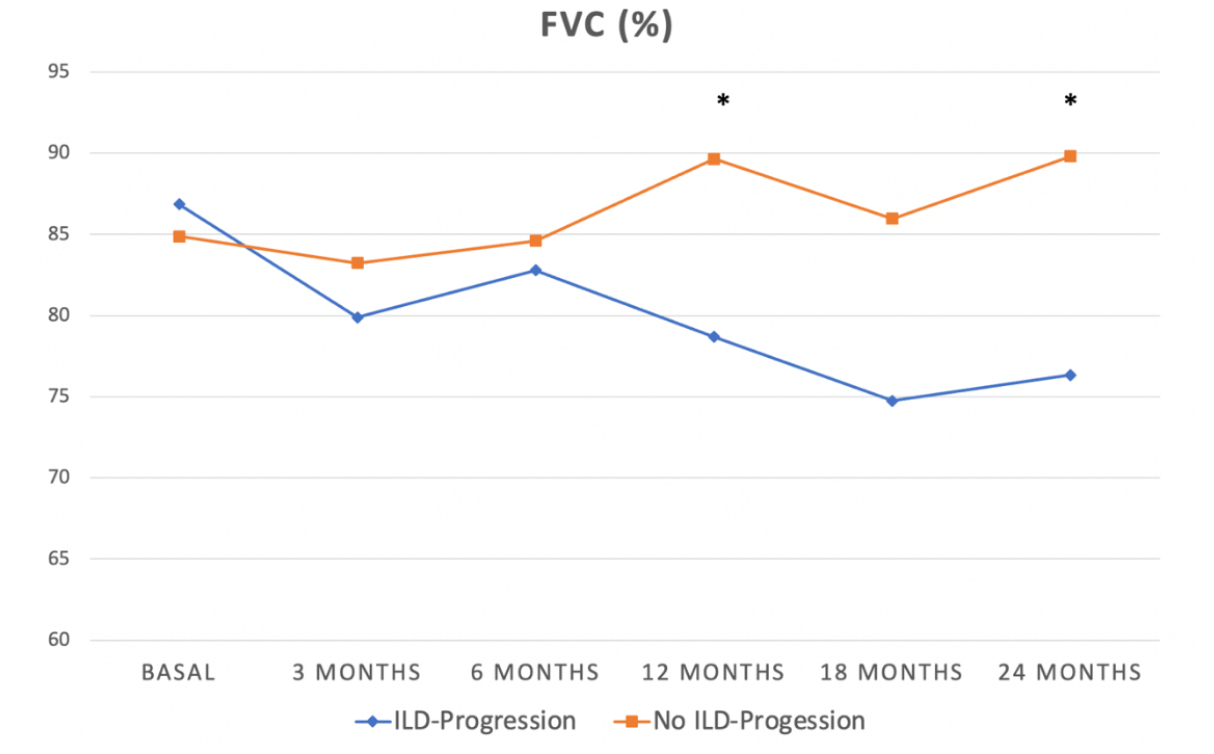Session Information
Session Type: Poster Session A
Session Time: 10:30AM-12:30PM
Background/Purpose: Interstitial lung disease (ILD) is a severe extra-articular manifestation of rheumatoid arthritis (RA). Abatacept (ABA) has demonstrated effectiveness in the treatment of RA-ILD, regardless combined or not with methotrexate and the radiological pattern. Although global results are satisfactory, there are patients who present progression of ILD despite its use. The characterization of this group of patients is crucial for its early identification and management. Our objective is to assess a) the RA-ILD patients treated with ABA with progression of ILD and b) comparative study with patients without progression.
Methods: From a large observational multicenter study of 526 RA-ILD patients treated with ABA, we selected those with available pulmonary function tests (PFTs) follow-up data. Progression of ILD was defined as an absolute decline of forced vital capacity (FVC) of ≥10% within 2 years of follow-up since ABA initiation (Figure). compared demographic and clinical variables of patients with ILD progression vs. patients with ILD improvement or stabilization. Results are expressed as percentage, mean±SD or median [IQR].
Results: We included a total of 343 patients with available data on FVC evolution, of which 80 (23.3%) presented ILD progression and 263 (76.7%) had a favorable lung function course. The differential baseline demographic and clinical characteristics between these 2 groups of patients are displayed in Table. We found no statistically significant differences between both groups in terms of age, sex, smoking, ILD duration up to ABA initiation, positivity of rheumatoid factor or anti-citrullinated protein autoantibodies, combined treatment, prednisone dose, baseline PFTs or radiological pattern. The differences in basal dyspnea and previous therapy with methotrexate and tocilizumab were statistically significant.
Conclusion: Almost a quarter of patients with ABA therapy presented ILD progression. There were few differences between progressive group and non-progressive group. Although ABA has consistently demonstrated effectiveness in the treatment of RA-ILD, its response should be closely monitored in all the patients to early detect progression.
To cite this abstract in AMA style:
Serrano-Combarro A, Atienza-Mateo B, Ibarrola Paino L, Casafont-Sole I, Loarce J, Blanco Madrigal J, Castañeda S, Ortega-Castro R, Mena Vázquez N, Vegas Revenga N, Dominguez Casas L, Peralta Ginés C, Diez Morrondo C, Pérez Albadalejo L, López Sánchez R, MANZANO CANABAL M, Brandy-Garcia A, Lopez Viejo P, Bonilla G, Maíz Alonso O, Carrasco-Cubero C, Garijo Bufort M, Moreno Martinez-Losa M, Urruticoechea-Arana A, Ordoñez S, González Montagut C, García-Valle A, De Dios J, Carreira P, Vázquez Rodríguez T, Fernández-Lozano D, Brana Abascal I, Melero-Gonzalez R, Giner E, Ruiz Esquide V, Ventin Rodriguez C, Rodriguez M, Andújar-Brazal P, Fernandez Melon J, López-Núñez L, LAMUA RIAZUELO J, Fernández Díaz C, Loricera J, Blanco-Alonso R. Rheumatoid Arthritis – Progressive Interstitial Lung Disease with Abatacept: Data from a Large National Multicenter Cohort [abstract]. Arthritis Rheumatol. 2024; 76 (suppl 9). https://acrabstracts.org/abstract/rheumatoid-arthritis-progressive-interstitial-lung-disease-with-abatacept-data-from-a-large-national-multicenter-cohort/. Accessed .« Back to ACR Convergence 2024
ACR Meeting Abstracts - https://acrabstracts.org/abstract/rheumatoid-arthritis-progressive-interstitial-lung-disease-with-abatacept-data-from-a-large-national-multicenter-cohort/


